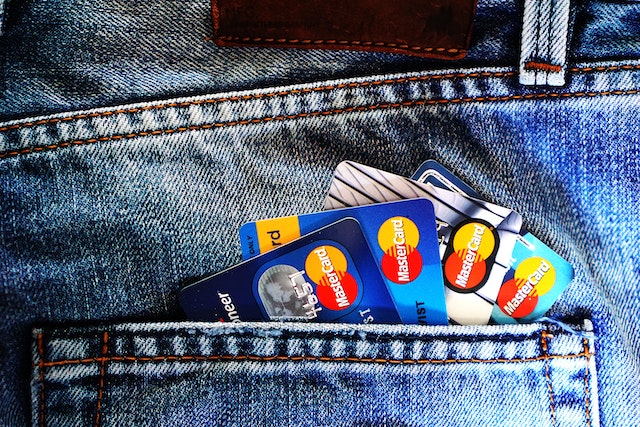Ya’ll ever wish you could just… bridge the gap between where you are and where you wanna be financially? Welp, if you’ve ever heard of a bridging loan then you already know it’s your safe haven. But did you know it could help (or hurt) your credit score? Here’s a detailed article about the impact of bridging loans on your credit score.
Let me help break it down for ya, like all dem old school jams.
Abridging loan, y’all, is when you borrow money during a short time period to cover the cost of somethin’ ya need realllllllll quick, like a house or a car. In other words, it bridges the gap between when ya need money and when ya get it, like when you don’t get that paycheck on time, ya know?
Now, here’s the real question – how does a bridging loan impact your credit score? Well, both positive and negative. And lemme break it down for you:
POSITIVELY:
– Paying back a bridging loan on time can improve your credit score. Yup, that’s right – when you pay it on time and make sure your debt to income ratio is still positive, your credit score is gonna look really healthy. It’s a sign of good credit management, so bonus points for ya!
NEGATIVELY:
– On the flip side, if you don’t pay your bridging loan back on time, or if it’s too large or your debt to income ratio ain’t lookin’ so good, this could damage your credit score. You don’t wanna get yourself in hot water, now do you?
So now you know how taking out a bridging loan can affect your credit score, let’s look at the potential impact it could have on your future credit applications.
MORTGAGE:
Lenders can look at the amount of money you’ve borrowed in the form of bridging loans in the past, so if it looks like you’ve taken out too many then your application could be turned down. Taking out bridging loans too often can reduce your chances of being approved for a mortgage in the future.
LOAN:
Just like with a mortgage, you’ll need to consider how many loan applications you’ve taken out recently. Too many bridging loans could be a red flag for potential lenders, who will be looking at your ability to pay back any new loan on time.
CREDIT CARDS:
When it comes to credit cards, it’s best to think of the bridging loans you’ve had in the past. Credit card companies want to know that you can manage your money responsibly, and if your credit score drops due to a past bridging loan, then this could make it difficult for you to get approved for a credit card.
Finally, if you are looking at taking out a bridging loan, how can you make sure your credit score still stays in the ‘good’ range?
– Always make sure your debt to income ratio is still positive. This is key!
– Try to use bridging loans as a last resort – if you can look into other budgeting options first, this is always preferable.
– Make sure you can pay back the loan on time, before committing to it.
Now isn’t that simple? I knew y’all could do it – credit scores ain’t as tricky as they look. Just make sure to balance everything out and you’ll be good to go!
What’s a Bridging Loan

What’s a bridging loan? Good question! I thought everyone knew what these things were. I guess that’s why they call it Bridging the Gap 101.
A bridging loan is the adult version of a school loan. It’s an interim loan that helps bridge the gap between what you already owe and what you need or intend to borrow. You use this loan to “bridge the gap“ so that you can pay off one loan and then use the new loan money to pay for something else.
It’s essentially a loan between loans. It’s like when I lent my buddy twenty bucks because he was a little short for his rent one month and had to borrow from me. I used the twenty bucks from my buddy to pay off my old lady’s parking ticket and then when I got my next paycheck I paid my buddy back. That’s kinda like a bridging loan.
Your credit score takes a hit if you default on a loan, and a bridging loan will be no different. So if you don’t pay off your bridging loan, your credit score will take a hit. That’s why it’s always a good idea to make sure you can afford the loan before you take it. Do your homework and make sure you can afford it before you commit.
Bridging loans are short-term loans, usually lasting anywhere between a few weeks to several months, which is why they can be so attractive. You don’t have to worry about long-term commitments or repercussions, like long-term debt or high interest rates if you don’t pay it back on time. Of course, the downside is, that you have to pay it back in a timely manner in order to keep your credit score from taking a hit.
So there you have it: bridging loans are a great way to bridge the gap between your existing debt and the money you need, but you have to pay careful attention to the terms and conditions, making sure you can afford to pay it back before you take it out.
How does a Bridging Loan Impact your Credit Score

Hey there! You’re here to find out about how Bridging Loans can effect your Credit Score, right? Well, get ready for the facts, because I’m about to lay it all out for you.
To start off on a positive note, Bridging Loans can sometimes have a positive effect on your Credit Score. That’s right, if you pay off a Bridging Loan in a timely manner, it can actually boost your Credit Score. This is due to the amount of debt you are paying off, and the frequency that you are paying it off. On the flip side, not paying off a Bridging Loan can have a negative impact on your Credit Score. This is because not paying off a Bridging Loan will require you to have to pay a late fee for the loan, as well as a higher interest rate. These two factors can drag down your Credit Score.
Now, let me show you what kind of impact a Bridging Loan can have in the future on your credit applications. If you’ve taken out a Bridging Loan in the past, and you’ve paid it off on time, then the chances are your Credit Score is going to be in the “Good” range.
However, if you apply for a Mortgage, Loan or credit card with a bad Credit Score, then you’ll likely be rejected, or you’ll be offered worse terms and conditions. This means you’re likely to be charged a higher interest rate, or a larger deposit may need to be made. Make sure you pay all your debts and payments on time, every time.
So how can you keep your Credit Score in the “Good” range with a Bridging Loan? Firstly, by making sure all your payments are up-to-date. Paying off the Bridging Loan on time and in full helps to boost your Credit Score. Secondly, the more often you use a Bridging Loan the better. By using a Bridging Loan once a year your scoring is likely to be higher than only using it one. Thirdly, paying off any debt you currently have will help to improve your Credit Score.
So, that’s just about everything there is to know about the impact of Bridging Loans on your Credit Scores. Remember, use Bridging Loans wisely, pay all your payments on time and in full, and keep your scores in the “Good”. Until next time, I’m Eddie Murphy and I’m out!
Positively
Hey there all you potential borrowers out there. So you’re thinking about taking out a bridging loan and you want to know what that’ll do for your credit score. Well, get ready for a fact blast about how great it can be for your credit score!
It turns out that taking out a bridging loan can have a really positive effect on your credit score. Are you ready for this? I’m gonna say it again – it can have a really positive effect on your credit score. Who’da thunk it?
Let’s break it down, E.T. style (boom!) Taking out a bridging loan is a good sign to lenders that you’re a responsible borrower, doing your best to manage your finances responsibly. When you successfully pay off a bridging loan, it’s seen by lenders as you’re a trustworthy borrower. That’s huge!
It’s also a great way to show lenders that you’re serious about succeeding financially. Don’t think that taking out a bridging loan is seen as a sign of financial distress – it isn’t, it’s seen as a sign of prudence!
Finally, taking out a bridging loan can have the really positive impact of increasing your credit utilization rate. This will have the benefit of improving your credit score over time – what are those ghostbusters chant? ‘Something, something! Credit score!’. You get the idea!
I know, I know, if you’re doing the math this all seems too good to be true – but it’s real people, it’s real. So if you’re thinking about taking out a bridging loan, you can rest assured that it’s going to have a positive effect on your credit score. Have fun reaching for the stars and never forget to always pay your bills on time!
Negatively
I’ve got bad news for you! Bridging loans can have a negative impact on your credit score. Yup, it’s unmistakeable: you’ll be taking a hit if you chose to go down this route.
How much of a hit, you ask? Well, that depends on how you manage your finances. Depending on how much you borrow, and how long it takes to pay off the loan, you could see a dip of up to 2 points (on the Vantage Score range).
But it gets worse. Let’s suppose that the loan process takes longer than anticipated, or worse, you can’t keep up with your payments. That could lead to a decrease in your credit score of up to 20 points!
That’s right, 20 points! Yikes! That kind of credit score dip could land you in a really sticky situation. Suddenly your lenders could lose trust in your ability to pay back, as it may signal that you’re a risky borrower. Plus, your credit utilization ratio could become higher than expected, not to mention the fact that you may miss payments, which would be a huge red flag.
Hey, I’m not here to scare you. I’m just sayin that it’s important to be vigilant when considering whether a bridging loan’s right for you. Be sure to check the interest rates and the term length before you sign on the dotted line. The last thing you want is to find yourself swimming in red color numbers. With that in mind, let’s move onto the next section.
What Impact Could it Have on your Future Credit Applications

If you’ve taken out a bridging loan, you’ll want to be extra careful when it comes to making future credit applications. Bridging loans can have a big impact on your credit score, depending on whether you make payments on time – or not.
Let’s start with mortgages. Applying for a mortgage after having a bridging loan can be tricky. Your mortgage lender may be careful about your credit score and inquire about the bridging loan you took out. Depending on the repayment time, your credit score could be affected, but this is something that your lender can guide you through.
Taking out a loan after a bridging loan is also a difficult task. Lenders look at your credit score and repayment history, and if you’ve made late payments on your bridging loan, then your chances of getting approved for a loan may be limited. Always make sure to do your research and reach out to lenders who are willing to take on potential risks.
As for credit cards, if you’ve taken out a bridging loan and not made your payments on time, it could put you in a bad spot. Most credit card issuers will do a background check of your credit score before approving your application. They also like to know how you handle your debts, so if you fail to make payments on time for your bridging loan this could be a big red flag and your application may be denied.
The good news is there are a few strategies you can take to keep your credit score in the “good” range and still take out a bridging loan. Always make sure to make your payments on time, and look into taking out additional debt protection, such as a credit monitoring service. This service can help you keep an eye on your credit score and alert you when something is off. You can also look into balance transfers if you’re finding it difficult to make payments. This way, you can pay off your bridging loan without damaging your credit score.
With a bit of knowledge and caution, you can make smart financial decisions and find yourself in a good situation! Just make sure to research and plan ahead when it comes to taking out a bridging loan, as it can have a big impact on your credit score – both positive and negative.
Mortgage
Well. What would we do without mortgages? For some of us they’re essential – they enable us to own our own homes. But when it comes to bridging loans and our credit score, mortgages come with a cautionary tale.
First of all, let’s talk about what a mortgage is. A mortgage is a loan that is secured against property, such as a house. Your mortgage provider then loans you money to purchase the property, and you pay them back over a period of time. It’s a big investment and one of the biggest financial decisions you’ll ever make, which is why so many of us crave the security of owning our own home.
But, while all of us dream of being homeowners, when a bridging loan is involved, it can have a negative impact on our credit score.
A bridging loan is a short-term loan usually secured against property. The loan is designed to ‘bridge’ the gap between buying a new property and selling your existing one. Although a bridging loan’s purpose is primarily to secure a property, when you do go for a mortgage, it can have a negative impact on your credit score.
Firstly, lenders consider all current debts when assessing a mortgage application, including bridging loans. The more debt you have to your name, the less likely you are to be granted a mortgage and so if you had a bridging loan, it may affect the interest rates you’ll be offered or the total amount you’ll be able to borrow.
Additionally, lenders check your credit history when considering a mortgage application. If you have a bridging loan in your history, it could make lenders think that you are a higher-risk borrower and you could see their interest rates increase. So, if you’re considering a bridging loan, think ahead!
Finally, it’s important to remember that lenders can often take a dim view of borrowers taking out bridging loans. This is because bridging loans are typically more expensive than other loans, and lenders see this as a sign of bad financial planning. So, if you need to take out a bridging loan, it’s important to be aware of how it could affect your credit score in the long run.
So, in summary, if you’re considering taking out a bridging loan, it’s important to do your research first. It’s not a decision that should be taken lightly, as it can have a big effect on your credit score down the line. Make sure to look at the interest rates and any other fees that come with the loan, as well as considering how it will affect your mortgage applications in the future. With careful planning, you can keep your credit score in the ‘good’ range despite having a bridging loan in your history.
Loan
Ahhhh, loan, the word that sends shivers down our spine. Finally, a topic I can get passionate about!
When taking out a bridging loan, people are often concerned about how this may impact their ability to take out additional loans in the future. When talking about loans in particular, bad credit scores can make it hard for you to acquire more financing.
So, the question here is: How will a bridging loan affect your credit score regarding taking out a loan in the future?
Well, the outcomes are a bit different depending on if you use the bridging loan to pay off an existing loan or not. For example, if the bridging loan is used in order to buy an asset, it could be seen as a positive by lenders since it implies financial planning. If, however, you’re using it mainly to clear an existing loan, then it’s likely that the credit rating will take a hit since it indicates an ongoing debt.
Lenders always assess the risk when looking at a credit score, and large amounts of debt can signal to them that lending money could be very risky. That said, depending on the amount the loan is for and your overall financial situation, lenders might still be willing to provide a loan, even with a recent bridging loan.
The best way to guarantee a good outcome here is to look at your finances as a possibility before taking out a bridging loan, and have a plan of action for paying off the existing loan once the loan has been taken out. As long as the bridging loan is used as a stepping stone to reaching a favorable financial situation and isn’t used as an end-all solution, it can be used in order to improve your credit score.
All in all, applying for a bridging loan isn’t always the ideal solution for managing your credit score. While it may be tempting, taking a loan out every time there’s a financial issue isn’t the answer. Instead, being proactive with your finances, gauging your risk correctly, and taking out bridging loans judiciously can help you avoid pitfalls and ensure that your credit score stays in the “good” range.
Credit Cards

Well have you ever been putting stuff in your cart at the store and the cashier says “Do you have a reward/credit card?”, and you look sheepish and say “no”?
Hah! Well you don’t have to feel left out any more if you’ve been looking into getting a bridging loan. See, bridging loans are short-term financial products that can benefit you a lot. In addition to helping with your current financial issues, a bridging loan can also help maintain your credit score!
Let’s talk about credit cards. Basically, if you go for a bridging loan, it can have a large impact on your credit score when applied for a credit card. On the one hand, bridging loans are secured against a property, so if you have one it is usually considered a sign of responsible money management. This in turn can give you a big boost in your credit score. On the other hand, The process of borrowing itself can be seen as a sign of risk taking and high debt levels, which could have a negative impact on your credit score.
But it doesn’t have to be all doom and gloom – if you are careful, you can keep your credit score at a solid “good” rating. To do this, try to keep your loan payments up to date, and don’t make too many credit applications at once. That way, you’ll keep your credit score at a good range.
So if you’re thinking about taking out a bridging loan, don’t worry too much about credit cards. Just watch how much you borrow and make sure you pay it off on time, and it should all be good. That way you’ll be sure to get the best deals and rewards when paying with plastic!
There you have it. Bridging loans can be a great help in securing the funds you need to make the leap from dream to actuality. The key is to keep the loan payments up to date, and don’t make too many credit applications at once in order to keep your credit score in the “good” range. So get out there and make your dreams come true! The world is your oyster!
How to Keep your Credit Score in the “Good” Range with a Bridging Loan

No one like to have a bad credit score, so it’s important to know how to keep your credit score in the “good” range when considering a bridging loan. Here’s some sage advice from the most knowledgeable of clowns–me.
First, sure, it pays to be informed. Make sure you know what your credit score is in the first place. It’s easier to manage if you know what you’re working with. And make sure know what’s out there, know the different types of loan products that are available and that meet your necessities best. Don’t make an impulse decision, but take time to research the best loan for your current financial situation. With that being said, let us now get into the details.
Yes, taking on a bridging loan can have an impact on your score, so make sure you’re familiar with the lender’s credit check process. Are they running a hard check or a soft check? Do they rely on alternative credit scoring? Do they look at your income? Make sure you’re prepared for that process and that you know how it will influence your credit score.
And of course, you gotta pay attention to the fine print. Interest rates and fees can change your score drastically. Missing payments to lenders can cause your score to plummet. Make sure you understand exactly what’s expected of you once you get the loan.
Know how much you can pay each month when it comes to a bridging loan. Generally, it’s suggested to pay off the loan as soon as you possibly can. Choosing to pay off the loan over a longer period of time could have a negative effect on your score. Paying the loan off early, however, can help improve it.
Additionally, once you’ve got the loan, don’t forget to monitor it. The more you monitor the loan, the easier it’ll be to keep on top of it. Even if you opt out of credit monitoring services, be sure to keep your own record of transactions, payments and balances for the loan.
Just a few simple tips and you’ll be right as rain when it comes to avoiding a full-on credit fiasco. You’ll have the loan and your credit score in the “good” category all at the same time. I hate to be the hat and all, but a good credit score is the key to being successful in today’s financial world. You got this!



